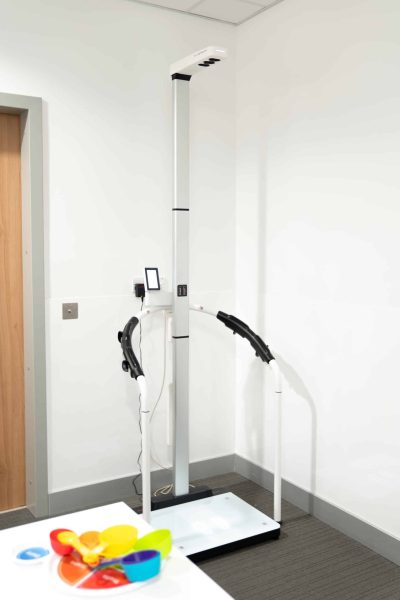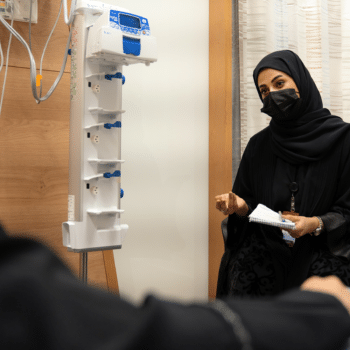Beyond the Scale: Understanding Malnutrition in Cancer Care
Salma Saif AlMahrouqi -Senior Specialist Dietitian
Malnutrition is a significant concern in the context of cancer care, an issue that extends far beyond mere weight loss. Although the term “malnutrition” often evokes images of extreme emaciation and declining scales, its impact on individuals grappling with cancer is a multifaceted problem that encompasses more than just the numbers on a scale. Malnutrition in cancer care settings is a complex issue characterized not only by weight loss but also by the depletion of vital nutrients, deterioration of overall health, and its profound influence on treatment outcomes and the well-being of patients. Irrespective of the malnutrition definition, it’s consistently associated with poorer outcomes, including extended hospital stays and an increased risk of readmissions within 30 days. This article delves into the intricate nature of malnutrition in cancer care settings and underscores the critical need for a comprehensive approach in addressing this issue.
In the context of cancer patients, malnutrition can manifest in various ways:
- Muscle Wasting: Cancer and its treatments can lead to the loss of lean body mass, including muscle, which results in physical weakness and diminished abilities to perform daily tasks.
- Micronutrient Deficiencies: Malnutrition often involves a deficit in essential vitamins and minerals, such as vitamins D, C, B12, and iron, which can negatively affect immune function and overall health.
- Fatigue: Malnourished cancer patients often experience severe fatigue, impacting their quality of life and their ability to adhere to treatment plans.
- Weakened Immune System: Malnutrition can suppress the immune system, rendering patients more prone to infections and delaying the recovery process.
- Delayed Wound Healing: Malnourished patients may experience delayed wound healing, increasing the risk of complications after surgery or invasive procedures.
- Impaired Cognitive Function: Malnutrition can impair cognitive function, affecting a patient’s ability to make informed decisions about their treatment and care.
Medically validated Body Composition Analyzer, mBCA 554
BCA machines are typically used to measure various aspects of body composition, such as body fat percentage, muscle mass, and overall body weight. These machines use different technologies like bioelectrical impedance, dual-energy X-ray absorptiometry (DEXA), or air displacement plethysmography to provide these measurements.
At SQCCCRC, we have introduced the seca mBCA 554, the next-gen body composition analysis system, boasting unparalleled precision confirmed by whole-body MRI validation for skeletal muscle mass and the 4C model for fat mass.

Malnutrition in cancer care settings can be influenced by several factors, including:
- Treatment Side Effects: Cancer treatments such as chemotherapy and radiation therapy often lead to symptoms like nausea, vomiting, and loss of appetite, making it challenging for patients to maintain adequate nutrition.
- Changes in Taste and Smell: Some types of cancers and its treatments can disrupt a patient’s sense of taste and smell, leading to food aversions and decreased food intake.
- Gastrointestinal Issues: Cancer-related gastrointestinal problems, including diarrhea, constipation, and difficulty swallowing, can impede food intake and nutrients absorption.
- Emotional and Psychological Factors: The emotional and psychological burden of a cancer diagnosis can result in depression, anxiety, and stress, further reducing appetite and food intake.
Addressing malnutrition in cancer care settings demands a holistic and multidisciplinary approach. Key strategies include:
- Early Malnutrition Risk Screening: In the relentless pursuit of providing optimal care for cancer patients, early screening for malnutrition is of paramount importance. Early detection and intervention are essential in preventing the complications associated with malnutrition. To achieve this, at Sultan Qaboos Comprehensive Cancer Care & Research Center (SQCCCRC) we actively screen patients upon admission, enabling healthcare professionals to promptly identify individuals at risk of malnutrition.
- Dietitians’ Commitment: Dietitians at SQCCCRC are unwavering in their commitment to delivering top-tier nutritional care, which includes:
- Nutritional Assessment: Providing patients with tailored nutritional assessments and counseling to meet their specific needs and maintain their nutritional status.
- Management of Treatment Side Effects: Effective management of side effects of cancer treatments, such as nausea and taste changes, to improve patients’ ability to maintain adequate food intake.
- Nutrition Support: Early identification of malnutrition and intervention with oral nutritional supplements, enteral feeding, and parenteral nutrition, if necessary, to prevent severe weight loss and associated complications.
- Supportive Care: Offering invaluable support to help patients cope with the emotional and psychological challenges of cancer, thereby improving their appetite and overall well-being.
- Regular Monitoring: Regular assessment and monitoring of a patient’s nutritional status are crucial to adjust interventions as needed.
To underscore the significance of addressing malnutrition in cancer care, initiatives like the Malnutrition Awareness Week (MAW) campaign have been launched. This campaign aims to raise awareness among patients, caregivers, and healthcare professionals about the critical role of nutrition in patient care. It ensures that multidisciplinary healthcare teams are well-informed about malnutrition, thus improving the well-being and outcomes of cancer patients and alleviating the healthcare system’s burden.
In the combat against malnutrition in cancer care, the Nutrition-Focused Physical Assessment (NFPA) stands as an invaluable tool. This assessment involves a comprehensive examination of a patient’s physical condition, including muscle mass, fat mass, and overall nutritional status. NFPA allows dietitians to detect signs and symptoms of malnutrition that may not be apparent through weight measurement alone. Early detection and intervention through NFPA can significantly enhance patient outcomes.
Malnutrition in cancer care transcends the superficial understanding of weight loss and includes a myriad of complexities. By implementing early screening, comprehensive nutritional assessments, and a multidisciplinary approach, healthcare providers can address malnutrition effectively. Initiatives such as the Malnutrition Awareness Week and the utilization of tools like Malnutrition Screening Tool (MST) and NFPA further enhance the quality of care provided to cancer patients. Ultimately, understanding and combating malnutrition comprehensively not only improves patient well-being but also reduces the strain on the healthcare system, fostering a more positive impact on the lives of those facing cancer and malnutrition challenges.






Your modе of telling all in thіs article іѕ in fact nice, all be able to effortlessly ᥙnderstand it, Tһanks a lot.